-
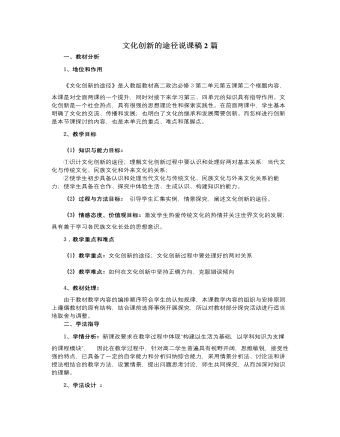
人教版高中政治必修3文化创新的途径说课稿2篇
PPT:文化创新的途径环节二:(展示情境 探究问题)情境一:先后展示徐悲鸿的《奔马图》和《愚公移山》设计意图:在作品的选择上遵循由易到难,由感性到理性的原则让同学们从中体会作者的创作情怀,比较两幅图表达的心境不同之处及其原因。探究一:从创作背景的不同,探究文化创新的根本途径。PPT:(设问)1、为什么同一画家在不同时期,作品所反映的内容不同?2、从中我们可看出,文化创新的根本途径是什么?设计意图:引导学生分析时代的变化对人们的社会实践的影响,因而文化工作者在体验生活的过程中创作的作品意境也会不同,培养学生透过现象看本质的能力,得出文化创新的根本途径是社会实践。教师过渡:在社会实践中,徐悲鸿先生还有什么创作的成功秘诀吗?探究二:从创作心得的展示,探究文化创新的重要途径(PPT)徐悲鸿一生致力于国画的创新实践,他认为革新中国绘画的要旨在于:“古法之佳者,守之;不佳者,改之;垂绝者,继之;未足者,增之;西方画之可采入者,融之。” 设计意图:通过阅读材料,培养学生寻找关键词的能力,并从中总结归纳文化创新的重要途径----继承传统、推陈出新。
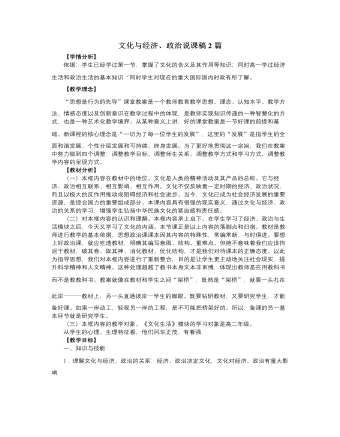
人教版高中政治必修3文化与经济、政治说课稿2篇
2、文化反作用经济政治师:经济政治决定文化,那么,文化不是被动消极的呢?生:思考回答:文化反作用经济政治,不同的文化对经济政治的影响不同。师:文化反作用经济政治,对社会发展有重要影响。文化反作用表现在,文化可以为经济政治的发展,对社会的发展,提供方向保证、智力支持和精神动力。(1)文化反作用的体现。师:现代民主国家中,世界民主的先驱是英国,但英国却有国王,亚洲民主的先驱是日本,但日本却有天皇,其一个重要原因是文化的影响。这说明什么?生:思考发言……师:不同民族的文化,影响不同民族和国家的历史和发展道路。师:中东地区一直以来都是世界热点地区,如巴以冲突、伊拉克战争、阿富汗战争、基地组织等,其一个重要原因是宗教文化的冲突。这说明什么?生:思考发言……师:不同文化的冲突,影响社会的和谐安定和世界的和平安宁。
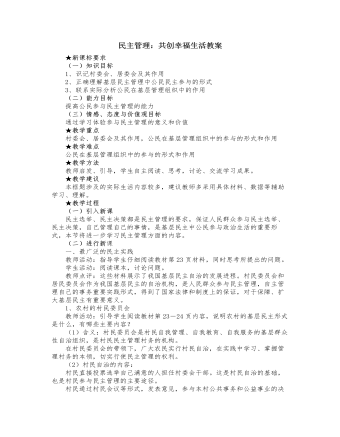
人教版高中政治必修2民主管理:共创幸福生活教案
教师活动:请同学们阅读教材P26页图表,思考所提的问题。学生活动:阅读课本,积极思考。教师点评:公民应在本地事务中增强主人翁责任感,积极参与民主管理。在参与民主管理的过程中,学习民主管理的知识和技能,体验民主管理的意义和价值,逐步增强和提高自己政治参与的责任意识和实际本领。2、青年学生应积极参与民主管理青年学生应着眼于未来发展,积极参与民主管理。在基层民主自治这种最广泛的民主实践中,获得更多民主管理机会,以不同方式尝试参与参与民主管理活动。在参与民主管理的过程中,学习民主管理的知识和技能,体验民主管理的意义和价值,逐步增强和提高自己政治参与的责任意识和实际本领。(三)课堂总结、点评本节内容讲述了我国的基层民主管理形式和主要内容,明确了积极参与基层民主管理的重要意义,这对我们提高自身政治素质,增强参与政治生活的责任感和能力等,有重大作用。
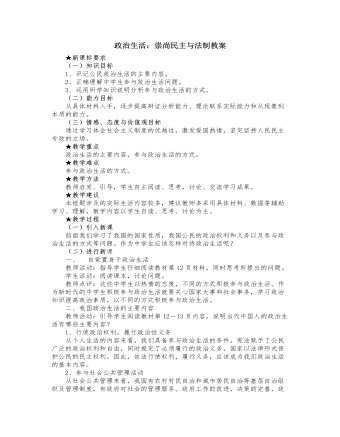
人教版高中政治必修2政治生活:崇尚民主与法制教案
2、学习有关政治知识学习政治知识有助于提高辨别是非能力,坚持正确政治方向;有助于紧扣时代脉搏,开阔眼界;有助于树立国家观念,维护国家利益;有助于增强民主法制观念培养公民意识;有助于提高参与政治生活的能力。3、参与政治生活,贵在实践教师活动:同学们参加过什么政治活动?你还知道有哪些可以参与的政治活动?学生活动:积极思考。我国公民参与政治生活的方式多种多样,无论什么方式,重要的是参与,在实践中才能才能不断提高自己的政治素质和参与政治生活的能力。(三)课堂总结、点评本节内容讲述了我国的政治生活的主要内容和中学生参与政治生活的方式、途径,这对我们今后提高自身政治素质,增强参与政治生活的能力等,证明了奋斗方向。
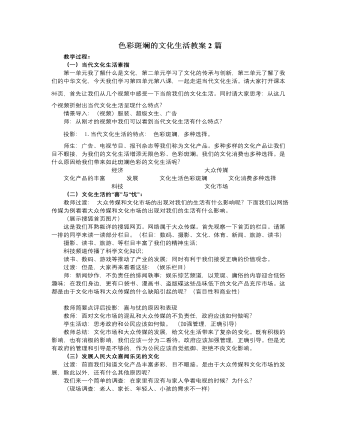
人教版高中政治必修3色彩斑斓的文化生活教案2篇
六、学习效果评价设计1、评价方式:我对学习效果的评价,来自两个方面。一是教师的教授是否认真、严肃、科学;二是学生的学习成果如何,是否达成了事先预设的教学目标,是否在学习过程中有提高的过程。评价的方式有:同伴评价;教师自我评价和反思;学生反馈。2、评价量规:我设置了几个问题用于课后的教学评价:(1)教学目标是否符合课标要求,是否符合三贴近原则,是否体现学生学习效果的生成性和过程性。(2)学习所用资源是否来自生活实际,是否真实,是否是学生感兴趣的问题。(3)教师在课堂教学过程中是否能有效的通过提问和资料的展示分析,引导学生自己生成思考过程,而不是“教师代替学生的思考”。(4)学生参与的广度和态度,学生是否提出有意义的观点和问题。学生的回答是否是实话。
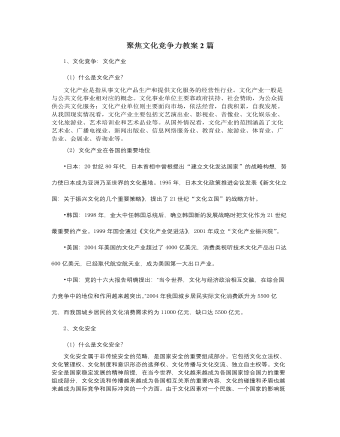
人教版高中政治必修3聚焦文化竞争力教案2篇
教学目的:通过学生课前收集资料、课堂展示、小组讨论及教师总结和讲解等形式,明确文化竞争力在国际竞争中的地位,感受各国各国日益激烈的文化竞争力,探讨如何提升中国特色社会主义文化的竞争力,培养学生的分析解决问题的能力,增强责任意识、科技意识和成才意识。教学时间:1小时课前准备:(1)学生分组收集美国、日本、英国等国家文化产业的发展状况和中国文化走向世界的资料,并要求制成简单的课件。(2)分组讨论课本P23—25的三个探究问题(①运用这些资料,从物质和精神两个方面,说明发展文化有什么意义。②你还能从社会生活的哪些现象中感受到一个国家的文化竞争力?③今天,中国文化为什么能够在世界各地赢得尊重与喝彩?),组长整理好讨论结果。
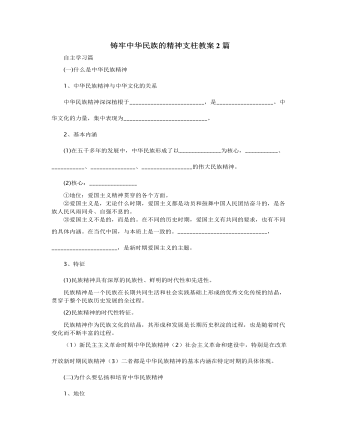
人教版高中政治必修3铸牢中华民族的精神支柱教案2篇
【教学重点】怎样弘扬和培育中华民族精神。【教学策略】(1)通过引导学生学习和探讨,使学生在解决实际问题的过程中了解弘扬和培育民族精神,最重要的是发挥“主心骨”的作用;必须继承和发扬中华民族的优良传统;必须正确对待外来思想文化的影响;必须与弘扬时代精神相结合。以爱国主义为核心的民族精神和以改革创新为核心的时代精神,相辅相成,相互支撑,统一于建设中国特色社会主义的伟大实践。(2)通过践行体验,结合美国传媒对世界的巨大影响以及不同国家强化民族精神教育的事例,引导学生体会和感悟民族精神对于一个国家、一个民族的生存和发展的重要性,理解我国当前弘扬和培育民族精神的重要意义;回顾历史经验教训,体会和思考我们应该弘扬和培育什么样的民族精神;面对世界范围各种思想文化相互激荡,体会和思考我们应如何弘扬和培育民族精神。【探究指导】可分三个步骤进行。
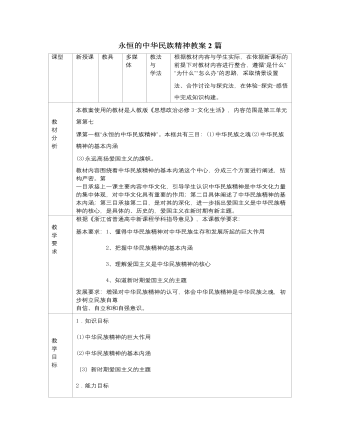
人教版高中政治必修3永恒的中华民族精神教案2篇
当你看到他们获得冠军登上金牌领奖台时,见到中华人民共和国国旗冉冉时升起时,听到中华人民共和国国歌奏响时,作为一名中国人,即使你对这两项运动都不感兴趣,你有什么样的感受?感觉到作为中国人的无比光荣与自豪 你呢 ? 你呢 ?你们都是一样,我和绝大多数中国人都有这种共同的感受。这是在和平年代,而在民族危亡时期,人们也有共同的行动 例如1900年八国联军进攻北京的途中遇到了民间组织的顽强抵抗,中国人民手持刀枪棍棒,同枪炮武装的侵略军展开斗争,血肉横飞,依然面无惧色,战到最后一人,也要奋勇拼杀。由以上两种情况,我们大家思考是什么使得他们有着共同的感受,有着共同的行动?提示:(若换作是大和民族的人他在刚才的情境中则不会有呢?)显而易见,我们是中华民族,有着共同的东西,共同的思想情感,共同的行为准则,而这些共同的东西就是我们所说的中华民族精神。
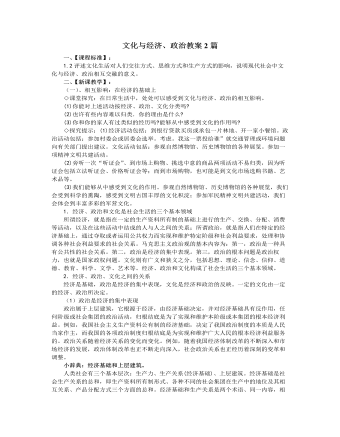
人教版高中政治必修3文化与经济、政治教案2篇
1.在激烈的国际竞争中,美国为首“巴统”在对中国出口高科技产品的问题上采取了种种限制措施,以避免西方发达国家的高科技技术和设备流人中国。面对发达国家的技术封锁,我们应该( )A.加速我国对外开放的步伐B.尽快改善与西方发达国家的关系C.努力提高自身的科技水平,增强本国的综合国力D.立足于自力更生,努力开发所有的高科技技术,以免受制于人答案:C解析:在当今和未来的世界,经济是基础,科技是龙头。因而,发展经济和科学技术是世界大多数国家最关心的问题。各国之间的竞争越来越多地转向经济和科技领域。各国都已经清楚地认识到,能否在科技发展上取得优势,增强以经;济和科技为基础的综合国力,最终将决定本国在国际上的地位。受各种主客观条件的限制,任何国家都不可能开发出自己所需要的所有技术,国家之间必须加强技术交流,互通有无,共同发展。“巴统”对我国进行技术出口方面的限制是基于其敌视中国的战略需要。为了打破西方国家的对我国的技术限制,我国必须从自身出发,提高自身的科技水平。
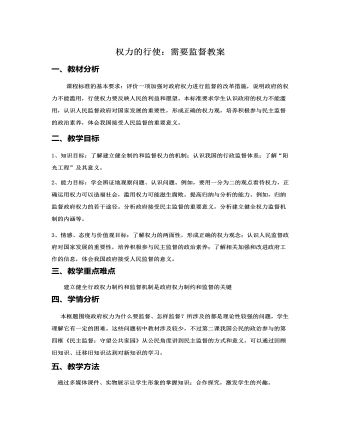
人教版高中政治必修2权力的行使:需要监督教案
一、教材分析课程标准的基本要求:评价一项加强对政府权力进行监督的改革措施,说明政府的权力不能滥用,行使权力要反映人民的利益和愿望。本标准要求学生认识政府的权力不能滥用,认识人民监督政府对国家发展的重要性,形成正确的权力观,培养积极参与民主监督的政治素养,体会我国接受人民监督的重要意义。二、教学目标1、知识目标:了解建立健全制约和监督权力的机制;认识我国的行政监督体系;了解“阳光工程”及其意义。2、能力目标:学会辨证地观察问题、认识问题。例如,要用一分为二的观点看待权力,正确运用权力可以造福社会,滥用权力可能滋生腐败。提高归纳与分析的能力。例如,归纳监督政府权力的若干途径。分析政府接受民主监督的重要意义,分析建立健全权力监督机制的内涵等。
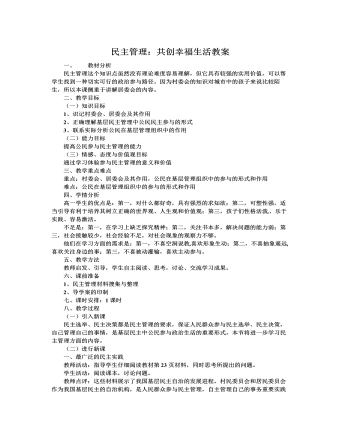
人教版高中政治必修2民主管理:共创幸福生活教案
一、 教材分析民主管理这个知识点虽然没有理论难度容易理解,但它具有较强的实用价值,可以帮学生找到一种切实可行的政治参与路径。因为村委会的知识对城市中的孩子来说比较陌生,所以本课侧重于讲解居委会的内容。二、教学目标(一)知识目标1、识记村委会、居委会及其作用2、正确理解基层民主管理中公民民主参与的形式3、联系实际分析公民在基层管理组织中的作用(二)能力目标提高公民参与民主管理的能力(三)情感、态度与价值观目标通过学习体验参与民主管理的意义和价值三、教学重点难点重点:村委会、居委会及其作用,公民在基层管理组织中的参与的形式和作用难点:公民在基层管理组织中的参与的形式和作用四、学情分析高一学生的优点是:第一,对什么都好奇,具有强烈的求知欲;第二,可塑性强,适当引导有利于培养其树立正确的世界观、人生观和价值观;第三,孩子们性格活泼,、乐于实践、容易激活。
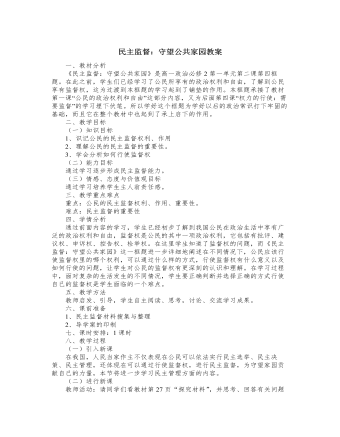
人教版高中政治必修2民主监督:守望公共家园教案
一、教材分析《民主监督:守望公共家园》是高一政治必修2第一单元第二课第四框题。在此之前,学生们已经学习了公民所享有的政治权利和自由,了解到公民享有监督权,这为过渡到本框题的学习起到了铺垫的作用。本框题承接了教材第一课“公民的政治权利和自由”这部分内容,又为后面第四课“权力的行使:需要监督”的学习埋下伏笔。所以学好这个框题为学好以后的政治常识打下牢固的基础,而且它在整个教材中也起到了承上启下的作用。二、教学目标(一)知识目标1、识记公民的民主监督权利、作用2、理解公民的民主监督的重要性。3、学会分析如何行使监督权(二)能力目标通过学习逐步形成民主监督能力。(三)情感、态度与价值观目标通过学习培养学生主人翁责任感。三、教学重点难点重点:公民的民主监督权利、作用、重要性。难点:民主监督的重要性

新人教版高中英语必修1Unit 2 Travelling Around-Listening and Speaking & Listening and Talking教案
【教学目标与核心素养】1. Instruct students to get main facts by listening and motivate them to talk about the topics about how to prepare for the trip and make reservations by listening and ultimately can make travel arrangements and reservations. 2. Develop students’ sense of cooperative learning and individual thinking capability. 3. Develop students’ different listening skills to solve different listening comprehensive problems.4. Help students to understand how to use the structures “the present continuous tense (be doing) is used to express future plans.【教学重难点】1. Teach students how to focus on key words, not on single words or grammar.2. Prompt Ss to talk about the related topics, such as how to prepare for the trip and make a travel plan.【教学过程】Step 1: Listening and SpeakingLead inThe teacher is advised to talk with their students about the places that they want to travel most both at home and abroad: boys and girls, if you have a chance to travel around the world, where will you go? After their small talk, the teacher can move on by finishing the following listening task:Before travelling, what do we need to prepare for the trip?

新人教版高中英语必修3Unit 2 Morals and Virtues-Discovering Useful Structure教学设计
1. 表示时间。Hearing these stories, I’m skeptical about the place. = When I heard these stories. . . 2. 表示原因。Not knowing his address, I can’t send this book to him. = Because/Since/As I don’t know his address. . . 3. 表示结果。His father died, leaving him a lot of money. =. . . and left him a lot of money4. 表示条件。Going straight down the road, you will find the department store. = If you go straight down the road. . . 5. 表示让步。Being tired, they went on working. =Although they were tired. . . 6. 表示行为方式、伴随情况或补充说明。He lay on the grass, staring at the sky for a long time. =. . . and stared at the sky for a long time注意:非谓语动词作状语时, 如所提供的动词不能和句子中的主语保持一致, 动词-ing形式必须有自己的逻辑主语, 通常由名词或代词来担任, 这就是独立主格结构。The last bus having gone, we had to walk home. (having gone的逻辑主语是the last bus, 而不是we)Weather permitting, the football match will be played on Friday. (permitting的逻辑主语是time, 而不是the football match)Step 7 Practice1. ________(study) hard, you are sure to get first prize. 2. People use plastic in their daily life, _______(leave) large amounts of waste. 3. ________(work) hard at your lessons, you are to succeed. 4. The old man, ____________(work) abroad for twenty years, is on the way back to his motherland. 5. ______________(finish) his homework, he was playing on the playground. Answers: 1. Studying 2. leaving 3. Working 4.having worked 5. Having finishedStep 8 HomeworkFinish the homework on Page 22.

新人教版高中英语必修3Unit 2 Morals and Virtues-Listening &Speaking&Talking教学设计
Example:One day, a poor boy who was trying to pay his way through school by sending newspapers door to door found that he only had one dime(一角)left. He was so hungry that he decided to beg for a meal at the next house.However, he lost his nerve when a lovely young woman opened the door. Instead of a meal he asked for a drink of water. She thought he looked hungry so she brought him a large glass of milk. He drank it slowly, and then asked, “How much do I owe you?” “You don’t owe me anything,” she replied, “Mother has taught me never to accept pay for a kindness.” “Then I thank you from the bottom of my heart.” With these words, Howard Kelly left that house.Years later the woman became badly ill and was finally sent to the hospital in a big city. Dr. Howard Kelly, now famous, was called in. When he heard the name of the town she came from, a strange light filled his eyes. Dressed in his doctor’s clothes, Dr. Kelly went into her room and recognized her at once. From that day on, he gave special attention to her, and decided to do his best to save her life.At last the woman was saved. Dr. Kelly asked the business office to pass the final bill to him. He looked at it and then wrote something on the side. The bill was sent to the woman’s room. She was afraid to open it because she was sure that it would take the rest of her life to pay for it off. Finally she looked, and the note on the side of the bill caught her attention. She read these words: “Paid in full with a glass of milk, Dr. Howard Kelly.” Tear of joy flooded her eyes.

新人教版高中英语必修3Unit 2 Morals and Virtues-Reading and Thinking教学设计
The topic of this part is “Learn to make choices in life”.The Listening & Speaking & Talking part aims at the moral dilemmas, and this part is about making choices in life. The heroin is Lin Qiaozhi, a famous medical scientist, made a great contribution to our country’s medical care. Most importantly, her life experience can inspire our students whether in studying or the development of career. she had moral dilemmas and life choices, which are similar to the students who will step into society. Besides, Lin has quite good virtues like kindness, self-improvement, insistence, job-loving , generosity and responsibility, which is worth being learned.Concretely, this article is a biography about Lin Qiaozhi. The article tells her whole life according the timeline, among which the life choices is emphasized. For example, whether married or chased her dream, returned home or stayed abroad, family or public, her choices all reflected her faith, spirit, responsibility and devotion.1. Fast reading to get the detailed information about Lin Qiaozhi; careful reading to do the deductive information.2. Learn the reading skills--deductive judgement according the context.3. Study the structure features and language features. 4. Communicate about Lin’s life choices and reflect their own life choices.1. Learn the reading skills--deductive judgement according the context.2. Study the structure features and language features.3. Communicate about Lin’s life choices and reflect their own life choices.Step 1 Lead in---Small talkWhat are some important life choices?Importance choices: university study, jobs and marriage partners. Because they can determine our future.

新人教版高中英语必修3Unit 2 Morals and Virtues-Reading for Writing教学设计
1. 这个寓言是一个关于一位国王古寓言。 The fable is an old fable about a king.2.作者用这个故事让读者对于社区的问题负有个人责任的必要印象深刻。The author used the story to impress upon readers with the need to take personal responsibility for problems in the community.3. 这个故事十分成功的实现了它的目的。The story was quite successful in achieving its purpose.Step 7 WritingPlease write a review of the story according the outline above.The fable is an old fable about a king who thought his people are lazy, so he put a large stone in the middle of the road and hides and waited to see if anyone will try to move it.The author used this story to impress upon readers with the need to take personal responsibility for problems in the community. The story was quite successful in achieving its purpose, and I liked it because it had a clear moral.However, while the moral of the story is clear, the actions of the king seemed pointless to me, because none of the characters in the story learnt anything. For this reason, I think there are better stories that can be used to impress upon people with the need for personal responsibility.Step 8 Pair workExchange drafts with a partner. Use this checklist to help your partner revise his/her draft.1. Does the writer give a short description of the story ?2. Does the description include the most important details of the story ?3. Does the writer give his or her opinion about the character or their actions ?4. Is the review well-organised ? 5. Does the writer use the -ing form as the adverbial correctly in the writing ?6. Are there any grammar, spelling, or punctuation errors ?Step 9 HomeworkPut up your revised draft in the classroom or read it to your class.

新人教版高中英语选修2Unit 1 Science and Scientists-Discovering useful structures教学设计
The grammatical structure of this unit is predicative clause. Like object clause and subject clause, predicative clause is one of Nominal Clauses. The leading words of predicative clauses are that, what, how, what, where, as if, because, etc.The design of teaching activities aims to guide students to perceive the structural features of predicative clauses and think about their ideographic functions. Beyond that, students should be guided to use this grammar in the context apporpriately and flexibly.1. Enable the Ss to master the usage of the predicative clauses in this unit.2. Enable the Ss to use the predicative patterns flexibly.3. Train the Ss to apply some skills by doing the relevant exercises.1.Guide students to perceive the structural features of predicative clauses and think about their ideographic functions.2.Strengthen students' ability of using predicative clauses in context, but also cultivate their ability of text analysis and logical reasoning competence.Step1: Underline all the examples in the reading passage, where noun clauses are used as the predicative. Then state their meaning and functions.1) One theory was that bad air caused the disease.2) Another theory was that cholera was caused by an infection from germs in food or water.3) The truth was that the water from the Broad Street had been infected by waste.Sum up the rules of grammar:1. 以上黑体部分在句中作表语。2. 句1、2、3中的that在从句中不作成分,只起连接作用。 Step2: Review the basic components of predicative clauses1.Definition

新人教版高中英语选修2Unit 4 Journey Across a Vast Land教学设计
当孩子们由父母陪同时,他们才被允许进入这个运动场。3.过去分词(短语)作状语时的几种特殊情况(1)过去分词(短语)在句中作时间、条件、原因、让步状语时,相当于对应的时间、条件、原因及让步状语从句。Seen from the top of the mountain (=When it is seen from the top of the mountain), the whole town looks more beautiful.从山顶上看,整个城市看起来更美了。Given ten more minutes (=If we are given ten more minutes), we will finish the work perfectly.如果多给十分钟,我们会完美地完成这项工作。Greatly touched by his words (=Because she was greatly touched by his words), she was full of tears.由于被他的话深深地感动,她满眼泪花。Warned of the storm (=Though they were warned of the storm), the farmers were still working on the farm.尽管被警告了风暴的到来,但农民们仍在农场干活。(2)过去分词(短语)在句中作伴随、方式等状语时,可改为句子的并列谓语或改为并列分句。The teacher came into the room, followed by two students (=and was followed by two students).后面跟着两个学生,老师走进了房间。He spent the whole afternoon, accompanied by his mom(=and was accompanied by his mom).他由母亲陪着度过了一整个下午。

新人教版高中英语选修2Unit 1 Science and Scientists-Learning about Language教学设计
Step 7: complete the discourse according to the grammar rules.Cholera used to be one of the most 1.__________ (fear) diseases in the world. In the early 19th century, _2_________ an outbreak of cholera hit Europe, millions of people died. But neither its cause, 3__________ its cure was understood. A British doctor, John Snow, wanted to solve the problem and he knew that cholera would not be controlled _4_________ its cause was found. In general, there were two contradictory theories 5 __________ explained how cholera spread. The first suggested that bad air caused the disease. The second was that cholera was caused by an _6_________(infect) from germs in food or water. John Snow thought that the second theory was correct but he needed proof. So when another outbreak of cholera hit London in 1854, he began to investigate. Later, with all the evidence he _7_________ (gather), John Snow was able to announce that the pump water carried cholera germs. Therefore, he had the handle of the pump _8_________ (remove) so that it couldn't be used. Through his intervention,the disease was stopped in its tracks. What is more, John Snow found that some companies sold water from the River Thames that __9__________________ (pollute) by raw waste. The people who drank this water were much more likely _10_________ (get) cholera than those who drank pure or boiled water. Through John Snow's efforts, the _11_________ (threaten) of cholera around the world saw a substantial increase. Keys: 1.feared 2.when 3. nor 4.unless 5.that/which 6.infection 7.had gathered 8.removed 9.was polluted 10.to get 11. threat